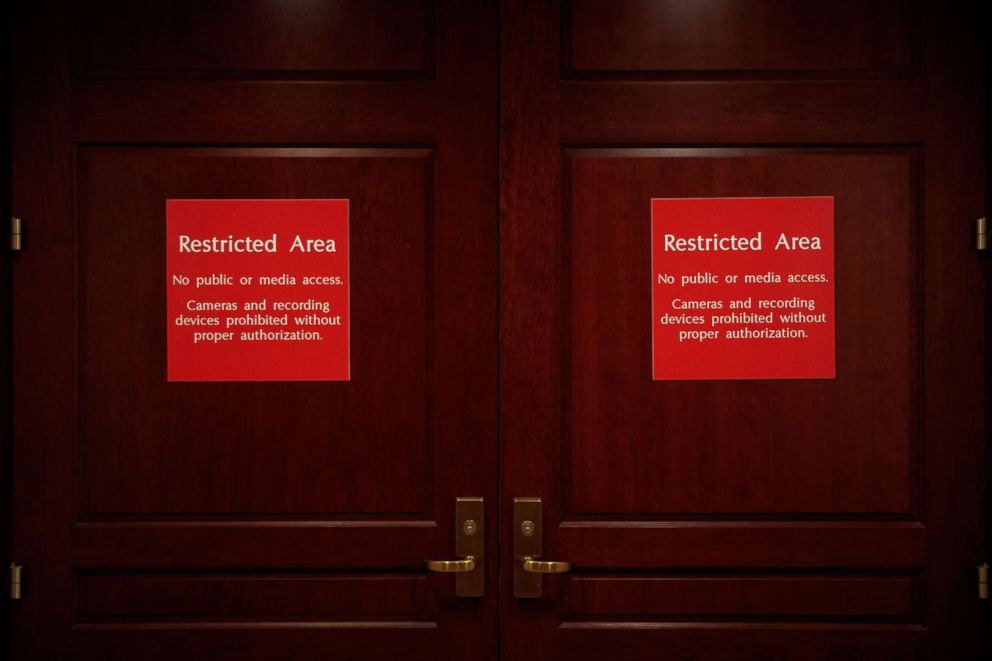Congressional investigators worry about threats to midterms with Russia probes incomplete
Congressional investigators are full steam ahead in Russia probes.
— -- Congressional investigators say they are increasingly concerned about threats to the coming midterm election with multiple probes into Russian meddling in the 2016 presidential election still incomplete with no immediate end in sight.
Among their top concerns, according to sources: Russia’s ability to further exploit and potentially influence American voters using social media platforms like Facebook and Twitter to circulate fake political ads containing disinformation.
The goal of devising and implementing preventive measures to address vulnerabilities seen in the 2016 campaign — before millions of Americans head back to the polls in November — has been eclipsed by high-profile political squabbling.
“I think to believe that Russia’s not attempting in the United States to do things potentially for the ’18 cycle, I think, would be ignorant on our part,” chairman of the Senate Intelligence Committee Sen. Richard Burr, R-N.C., said at the Council on Foreign Relations earlier this month.
“I think all of my colleagues probably are worried or should be worried about it. I think every state should be worried about it,” he said.
Democratic Sen. Mark Warner of Virginia, and Burr's counterpart on the committee, called the Russia probe "the most important thing I will ever work on."

In January, the U.S. intelligence community issued a consensus report assessing that Russian President Vladimir Putin ordered an influence campaign in 2016 aimed at the U.S. presidential campaign to undermine the public’s faith in the American democratic process.
The Senate Intelligence Committee’s investigation into Russian meddling is one of three ongoing congressional probes on Capitol Hill. Investigators in both the House and Senate are also scrutinizing possible collusion between the Kremlin and associates of President Donald Trump.
In the 11 months since the inception of the Senate Intel Committee’s investigation, well over 100 people have been interviewed, Burr said. In recent months, investigators on the Hill have honed in on President Trump’s innermost circle. His son Donald Trump Jr., and his son-in-law Jared Kushner have appeared before Senators and aides for sometimes hours-long questioning.
The bulk of questions in those interviews largely centered on a June 2016 meeting at Trump Tower between Kushner, Trump Jr. and a Kremlin-linked Russian lawyer who had promised dirt on Hillary Clinton, sources familiar with the sessions have told ABC News.
In nearly every interview, investigators learn about new people they should be interviewing, Burr said, which puts “about three more weeks into” the investigation, adding to their long list of possible witnesses.
Burr said that while the committee’s findings likely won’t play out like some media reports have suggested, some of it will “probably be alarming and concerning.”
“I think the committee’s role is to assess what we did or didn’t do, and to make from that recommendations as to hopefully how we change our policies going forward,” he said.
While some homeland security experts warn those recommendations can't come soon enough, lawmakers on both sides of the aisle insist the probes will continue well into 2018.
“If we want to adhere to a political timetable the majority will bring this to an end, but it will be a tremendous disservice to the country,” Rep. Adam Schiff of California — the top Democrat on the House Intelligence Committee — said last month.
Schiff told ABC News there are "dozens" of witnesses yet to be interviewed and “months of work” yet to be done in the House Intel Committee probe, which has been operating in parallel to its Senate counterpart.
“The worst thing I think we can do would be to make a report to the public that was incomplete and therefore misleading and have to explain why months from now what we told the public just wasn't true because we didn't want to find the evidence,” Schiff said.
Burr signaled it’s possible his committee will publish an interim report before primaries next year to help state and local governments prepare for their respective elections’ security. The first primary race is in March 2018.
The Senate’s Judiciary Committee is conducting a third investigation into the 2016 campaign and aftermath but with a narrower focus. Judiciary investigators are primarily focused on potentially improper political influence or bias inside the Department of Justice; the circumstances surrounding the firing of former FBI director James Comey; and the DOJ's activities related to Hillary Clinton.
Meanwhile, Special Counsel Robert Mueller’s independent probe — an inquiry aimed at determining whether any crimes were committed — appears to be going full steam ahead. Mueller’s wide-ranging investigation has already produced an indictment of two Trump associates and two other guilty pleas, and is expected to last at least several more months.
Mueller is investigating whether there was any improper collusion between associates of Trump’s presidential campaign and Russia in connection with the 2016 election and whether there have been attempts to obstruct the Justice Department's investigation. The special counsel has also been probing the financial dealings of some key Trump aides.
Democrats are increasingly warning that Trump could order the firing of Mueller.
Warner said earlier this month that if Mueller is fired it would be a “gross abuse of power.” He also called for Congress to respond with “significant consequences” if Trump took that step.
"Any attempt by this President to remove special counsel Mueller from his position or to pardon key witnesses in any effort to shield them from accountability or shut down the investigation would be a gross abuse of power and a flagrant violation of executive branch responsibilities and authorities," Warner said. "These truly are red lines and simply cannot allow them to be crossed."
Trump has not publicly said he's weighing firing Mueller.




